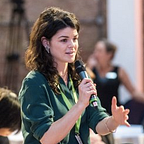Why now’s the time to start.
We have just wrapped up our 6th cohort. This is always a good time to reflect on the kind of people we believe make the best founders, and why it makes sense for them.
There is never a right time to start a startup. You will never know enough, have enough cash, or have the right contacts.
But, for certain individuals there is a real cost to not founding a startup now.
You have just finished your PhD in a technical subject.
If you have been working on a PhD, particularly if it’s in Computer Science, it’s likely you have been working on technology that has only been possible within the last 12–18 months. As you are surrounded by peers working on the same technology day-to-day, you may not realise how rare those skills are; particularly within the founder population.
What’s more, those skills will decline in value. The longer you wait to build a startup, the lower the value of those skills — they become more ubiquitous and built into the norms of Computer Science education. Spending a couple of years getting industry experience after your PhD has a high opportunity cost — it’s the cost of your startup working on cutting edge technology. We want to work with the founders who can make fundamental leaps in technology happen. What’s more, the investment community has never been more excited about investing in deep tech.
You know the problem you want to solve.
If you’ve been working in industry for a while, it’s likely you’ve spotted a number of frustrating inefficiencies that you’re too busy to solve. However, if you’ve spotted those problems, it’s likely that your colleagues have too. As becoming a founder becomes a more acceptable career path, you need to decide whether you’re going to be the kind of person who talks about what they would do as a founder, or the kind of person who makes that leap.
The opportunity cost of leaving that problem on the table is significant. If you really have found a valuable problem to solve, it won’t be long before others identify it and solve it. This is particularly pertinent if you have a skill-set that allows you to solve that problem more effectively than others; this creates higher barriers to entry for other founders.
You’re considering your first job offer.
Drew Houston, founder of Dropbox, said “you should be thoughtful about the experiences you are willing to miss out on [to build a startup]”. This is a useful frame, but I think the opposite is more provocative; what experiences do you value more highly than starting a startup? If you are applying for corporate jobs, or to work at a tech giant, is it because you believe that experience is more valuable to you than learning how to found a startup?
It might be that it is. And that’s ok. Not everyone should found a startup.
However, if you’re the kind of person who is motivated by the gradient of the learning curve, it’s likely you are undervaluing the experience of starting a startup.
Applications are open to build a startup with EF next year
Entrepreneur First (EF) has built more than 100 startups over the last five years. Our most recent exit is Magic Pony Technology which was sold to Twitter for a reported $150m, just 18 months after it was founded. The two founders were Imperial grads, one from a masters and one from a PhD. They both had recognised the opportunity cost of taking traditional career paths and joined EF instead.
If you believe that for you the cost of not founding a startup has become too high, get in touch. We’d love to hear from you.
Alice Bentinck is Co-Founder of Entrepreneur First (EF.) EF runs full-time programmes that fund the most talented scientists, engineers, developers and industry experts to find a co-founder, then helps those teams grow their businesses and raise funding. We’ve built >100 companies worth >$1B so far.
We currently run programmes in Berlin, Singapore and London, you can apply here or sign up below to get advice from the EF team on your startup journey.
